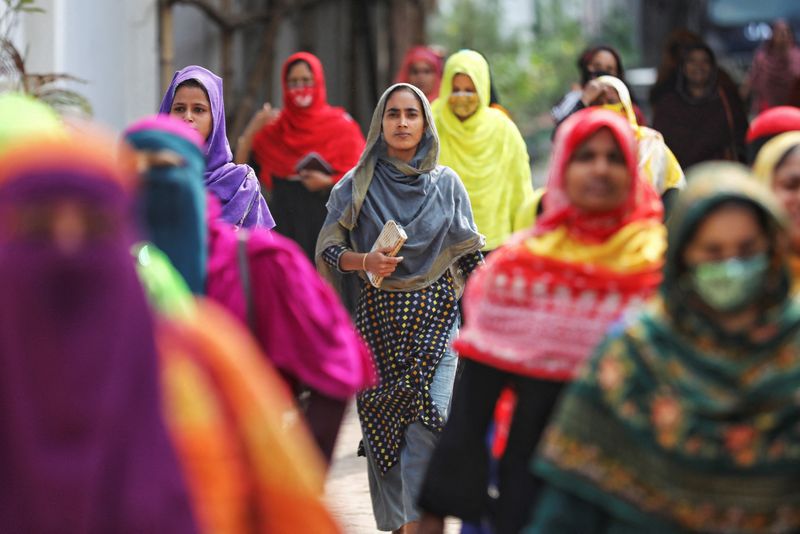By Ruma Paul and Krishna N. Das
DHAKA/NEW DELHI (Reuters) - Several clothing factory owners in global fashion manufacturing hub Bangladesh are asking clients that include H&M (ST:HMb) to help them pay for an almost 60% government-mandated hike in wages, well aware that weaker sales might stymie their efforts.
Following a week of deadly clashes between garment industry workers and police over pay, the government on Tuesday said the minimum wage would rise by 56.25% to 12,500 taka ($114) a month from Dec. 1, the first increase in five years.
A panel of factory owners, union leaders and officials agreed to the increase unanimously, said Siddiqur Rahman, the owners' representative. Low wages have helped Bangladesh become the world's largest garment exporter after China, but soaring fuel and power prices have added to the spiralling cost of living for people in this developing South Asian nation.
Speaking to Reuters on Wednesday, Rahman said the wage hike - which comes ahead of a January general election - could be a "disaster" for an industry that accounts for almost 16% of GDP and generates more than $40 billion a year in export receipts.
Bangladesh is home to more than 4,000 factories that supply global brands ranging from fast fashion retailers such as Zara-owner Inditex (BME:ITX) and Gap Inc (NYSE:GPS) to the more upmarket Hugo Boss and Lululemon (NASDAQ:LULU).
But like most makers of consumer goods, fashion retailers are grappling with high inventories and a slowing global economy, where shoppers in key markets are buying less as they feel the pinch. That has led to a 14% drop in Bangladesh's garment exports last month.
"The timing is not good," said Fazlul Hoque, managing director of Plummy Fashions and former president of the Knitwear Manufacturers & Exporters Association, about the wage hike.
"The industry is already struggling, order flow is slow, energy supply is not adequate and the overall economic situation is not good. In such a time, a big hike in wages certainly will be tough... but for workers, I agree it is a legitimate demand."
Hoque said the increase would add 5-6% to overall costs, a rise he and other factory owners have asked their clients to help shoulder by agreeing to higher rates. Labour accounts for 10% to 13% of their total costs.
He is not optimistic, however.
"In the past, we have seen that they increase only a bit, not enough to pay the extra cost," Hoque said. "There might be exceptions, but there are thousands of buyers, and not everyone will agree to cover the whole amount. There is no legal enforcement on the buyers."
Last month, several fashion brands including Abercrombie & Fitch, Adidas (OTC:ADDYY), Gap, Hugo Boss, Levi Strauss (NYSE:LEVI), Lululemon, Puma, PVH (NYSE:PVH) and Under Armour (NYSE:UA) told Prime Minister Sheikh Hasina in a letter they were "committed to implementing responsible purchasing practices" to enable higher wages.
"We continue to recommend that the government of Bangladesh adopt an annual minimum wage review mechanism to keep up with changing macroeconomic factors," the letter said. In addition to the wage increase, the government has said that workers would be given a 5% annual increment.
Babul Akter, president of the Bangladesh Garment and Industrial Workers Federation, urged global brands to pay more, saying: "There could be some problems for the owners to cope with the increased salaries."
But Abdus Salam Murshedy, managing director of the Envoy Group that sells to Walmart (NYSE:WMT), Zara and American Eagle (NYSE:AEO) Outfitter among others, said buyers were unwilling to pay the "right price, the fair price" with major economies slowing and the wars in Ukraine and in the Middle East raising geopolitical concerns.
"Words from buyers are fine but when they place orders, they say there are many other competing suppliers, so you better do this, do that," said Murshedy, who is also a lawmaker from Hasina's Awami League party.

"The industry needs to be able to pay for its costs. If there is no industry, where will the workers work?"
($1 = 110.0000 taka)
